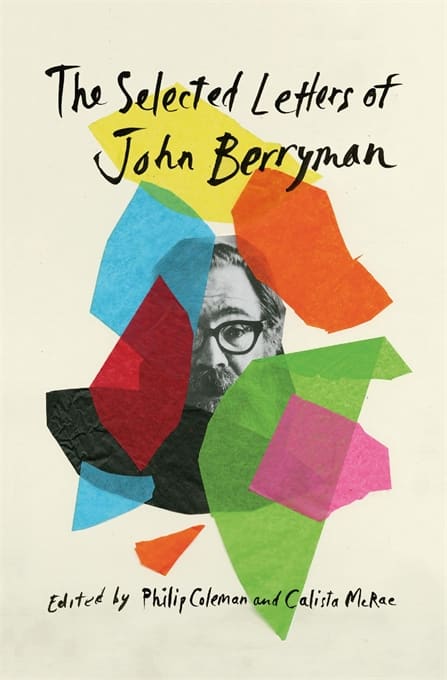The Selected Letters of John Berryman book review
[ad_1]
One might expect a person to feel contented after such triumphs. Not so for Berryman. “You were right abt the Pulitzer, and I was wrong,” he wrote publisher Robert Giroux in June 1965. “It doesn’t matter a straw.” In fact, the award changed the way the literary world regarded Berryman, and brought him heaps of attention. But it did not, and could not, change the man himself. Perhaps some part of him had hoped the acclaim would release him from the cycle of addiction, despair, hospitalization, recovery and subsequent collapse he had fallen into. Berryman expected a great deal of himself, of fame and awards, and of life. Inevitably, he was frequently disappointed.
“The Selected Letters of John Berryman,” chronicles that cycle of breakdown and recovery, expectation and disappointment, through more than 600 pages of correspondence. Berryman’s troubles began early: His father’s suicide, when Berryman was 12, proved to be the kind of trauma that never releases its grip. Berryman often spoke of his own eventual suicide as if it were inevitable, and in 1972, after years of struggling with alcoholism and depression, he made the prediction true, by jumping off a bridge in Minnesota.
Berryman often seemed to romanticize death. In darker moments, it was an escape, a promised relief. As early as 1948’s “The Ball Poem” we find him promising that “Soon part of me will explore the deep and dark / Floor of the harbor.” In more optimistic moods it represented a kind of rebirth. One of the many surprises of the “Dream Songs” is that, a mere 26 poems into the first volume of the sequence, its protagonist, “Henry,” passes away: “I had a most marvelous piece of luck. I died.” Flip the page, though, and Henry seems to be alive and kicking. The second volume begins with a sequence of “Opus Posthumous” poems, throughout which, it appears, Henry is dead again. But before long Henry, a “Lazarus with a plan,” is dug up by his friends, and is once again off to the races.
Perhaps Henry was merely pretending to be alive throughout most of the “Dream Songs” — a state Berryman knew well. In 1942, he wrote to Eileen Mulligan, who would soon become the first of his three wives, “I am fed up with pretending to be alive when in fact I am not.” Berryman was always reminding people he was not Henry. But that intimate knowledge of endlessly repeated suffering, death and resurrection had to come from somewhere. Again and again in these pages Berryman loses, abandons or wrecks a job, a professional endeavor or a relationship — always, soon afterward, to embark on a new one. Something new — a fresh project, a fresh face — is always coming along to command his attention. “I used to ascribe my lifelong failure to finish anything to my 24-year old alcoholism,” he wrote his friend Mark Van Doren in 1971. “But I can’t buy that.” It stemmed, he sensed, from a deeper and more profound element in his character.
Happiness was as transformative for Berryman as suffering, and his accounts of ecstasy and contentment are as wonderful as his depictions of anxiety and despair are piercing. Having finished a long poem — his early masterpiece, “Homage to Mistress Bradstreet” — he writes to friends, “I can never again have any drink that I had or was to have before I got done this new poem, which is entirely different from anything I ever did before and much less bad and has left me different and less at the world’s mercy — not even drinks taste the same, it is as if each drink were at last related to something — before I embark on a philosophy of martinis I had better shut up & go to bed.” This kind of playful exuberance is abundant here, not only in the early letters but throughout those of his later, darker years. Indeed, bleak circumstances often bring out the comic edge of Berryman’s sardonic wit.
This is a long book that I wish had been longer; on turning the last page, I was eager buy a second collection. The voice of these letters is recognizably the voice of much of Berryman’s poetry. Language was, for him, not functional or utilitarian but a performance medium. His early letters to friends like Bhain Campbell and E.M. Halliday are utterly delightful and frequently hilarious. (His angry letters, whether to tin-eared critics, irresponsible scholars, or neglectful landlords, are also hilarious, but in a different way.) A letter to Chris Haynes, the woman with whom he had an affair in 1947, and who inspired the most playful of his works, “Berryman’s Sonnets,” is charmingly seductive; though it’s puzzling that only one letter to her has been included in this volume.
I would have liked, too, a bit more assistance from the editors. (To be fair, there are over 1,300 notes, but they leave many references somewhat obscure.) Readers of “Selected Letters” will find it useful to have a biography of Berryman nearby, to fill in the missing framework. But all of these are minor quibbles, and none of them diminishes the tremendous pleasure and fascination of this long-overdue collection. After too long an absence, it is wonderful to see Berryman once again resurrected.
Troy Jollimore’s fourth collection of poetry, “Earthly Delights,” will be published next year.
THE SELECTED LETTERS OF JOHN BERRYMAN
Edited by Philip Coleman and Calista McRae
Harvard University Press. 736 pp. $39.95
[ad_2]
Source link
